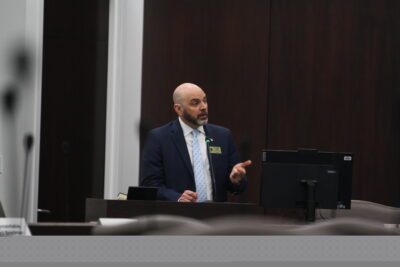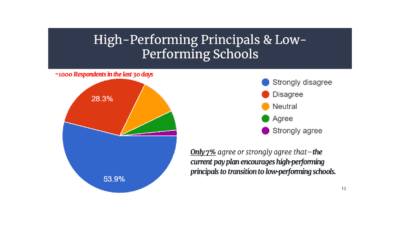

|
|
In North Carolina, public school systems are the largest employer in nearly half of the state’s 100 counties.
While school superintendents act as the chief executive officer (CEO), chief financial officers (CFO) are responsible for managing school system budgets. The work of a CFO often goes unnoticed by the general public — until something goes wrong.
In January, Durham Public Schools (DPS) staff members learned prior raises would be changed, following major accounting errors regarding implementing a 2023 salary study. Soon after the issues became public, both CFO Paul LeSieur and Superintendent Pascal Mubenga resigned.
After weeks of disruptions and school protests, the DPS Board of Education voted at the end of February to stop paying last year’s promised raises at the end of the month, instead giving across-the-board 11% raises to 1,875 classified staff members the rest of the school year — based on last year’s salaries.
Mistakes in budgeting put a strain on school budgets, but so can unexpected issues with a district’s physical plant, like in the Alamance-Burlington School System (ABSS). Multiple ABSS system leaders have resigned — including the superintendent and CFO — after significant mold problems last summer and major repairs at older schools led to budget shortfalls.
Multiple other districts have recently announced budget shortfalls — including the New Hanover, Charlotte-Mecklenburg, and Carteret school districts — due to a nearing federal funding cliff and difficulties implementing state-mandated raises.
At the same time, school district leadership must also think about potential upcoming changes to school enrollment due to the expansion of private school vouchers in North Carolina.
Amid all these changes and challenges, school finance officers must work to maintain their school fund balances at a healthy level. Fund balances essentially operate like saving accounts for public schools, and are likely to play an increasingly important role in budget planning moving forward. You can read EdNC’s look at school fund balances over the last 10 years here.
Needless to say, being a CFO is a particularly complex job, with huge impacts on the health of our schools.
“It’s a huge amount of stress,” said Kelly McClellan, who previously worked as a CFO for nearly 10 years. “There’s just this overwhelming sense of responsibility with what you do.”
‘The role is crucial’
Yearly school budgets in North Carolina range from $12.8 million in Hyde County Schools to $1.9 billion in Wake County Schools, according to 2021-22 data from the Department of Public Instruction (DPI).
“People often don’t realize just how big a school budget really is,” said Mark Garrett, superintendent of Henderson County Public Schools. “For example, our budget is about $145 million, depending on the year, and that’s quite a bit to manage. So you’ve got to have that chief financial officer.”
CFOs must maintain proper accounting processes in the district, Garrett said, while also constantly and creatively utilizing federal, state, and local school funding sources. In North Carolina, much of state funding is organized in allotments, which can be complicated to navigate along with other funding buckets.
“You just have to have somebody that can keep all of those plates spinning in the air,” Garrett said.
In North Carolina, most CFOs have at least three years of business experience and a four-year degree with a concentration in a business-related curriculum, according to the North Carolina Association of School Business Officials (NCASBO).
NCASBO was created in 1982 and is the primary training organization for school business officials in North Carolina. The organization hosts three conferences a year, and contracts with DPI to provide mentor and technical assistance to finance officers with five or less years of experience.
“The role is crucial, because they are responsible for the managing of the financial operations and resources for the school district,” said NCASBO Executive Director Pam Satterfield. “They do their best to manage the financial resources efficiently and effectively… and try to optimize the use of funding whenever possible.”
Satterfield, who formerly worked as CFO for Richmond County Schools, said primary responsibilities include managing and overseeing the district’s budget, payroll, and financial reporting. DPI requires monthly reports from CFOs across the state.
Roughly 80% of a district’s budget is spent on payroll, which a CFO is responsible for overseeing. Finance officers should also provide a framework of checks and balances within the district to prevent and minimize mismanagement of funds. Management of a district’s finance department plays a large role in such a framework.
Upon being hired, CFOs must obtain a School Business Official (CBO) certification. Maintaining that certificate requires at least 24 Continuing Professional Education (CPE) hours each year. That is more required renewal training hours that any other district positions in the state, according to the NCASBO.
The State Board of Education must approve all district finance officers.
After June 30, 2023, per State Board of Education code, the minimum qualifications of CFO candidates are five years of professional experience in finance operations combined with one of the following:
- A baccalaureate degree from an accredited four-year college or university with a minimum of 15 semester hours in accounting.
- A licensed Certified Public Accountant (CPA).
- Certification by the State Board of Education as an LEA school finance officer prior to July 1, 2023.
The LEA Finance Officer is responsible for all fiscal affairs of the school system, including the State, federal and local funds, the enterprise funds, and capital operations. The finance officer shall install and maintain an integrated system to plan fiscal operations to ensure sound decisions, accountability, and transparency.
This legislatively required position, per G.S.115C-435, must be able to interpret and follow fiscal regulations prescribed by the North Carolina General Statutes, State Board Education, federal agencies, the Local Government Commission, and other funding entities. This position is the financial leader of the school district and is required to have a comprehensive accounting knowledge including the ability to interpret and implement new accounting standards, per GASB. This position is a critical component of the leadership team of a school district.
State Board of Education code on school finance officers
Here is a list of some of the other “essential job functions” of CFOs, from State Board of Education code:
- Prepares and maintains the school district annual budget; analyzes … the local boards and local superintendent’s initiatives and ensures appropriate and allowable funding sources. Manages all activity for a balanced budget that is in compliance with the School Budget and Fiscal Control Act.
- Analyzes various financial, personnel, and student data and records for leadership decision-making. These analyses are used in preparation of reports as required for submission to local, state, federal oversight agencies and/or superintendent and board.
- Maintains a payroll system in compliance with state and federal laws and regulations, including the Fair Labor Standards Act and the Internal Revenue Service Code, as well as procedures related to salary and absence data required by the State Board of Education.
- Oversight of the school system purchasing and contract procedures to ensure compliance with local, state, and federal policies.
- Ensures compliance with the Federal funding expenditures to ensure compliance of federal regulations including Uniform Grant Guidance and specific grant requirements.
- Maintains the general ledger system, including adjusting journal entries, budget adjustments, chart of account maintenance, and reconciliation of general ledger accounts to ensure accurate account balances and adherence to general accepted accounting principles (GAAP). Utilizes a complex chart of accounts and recognizes and researches appropriateness of accounts codes on payroll expenditures, payroll collections, and non-salary expenditures and determines required steps for resolution.
- Responsible for the year-end financial statements for the annual independent audit and the school system’s Annual Comprehensive Financial Report (ACFR). Provides auditors (independent, state and/or federal) all required reconciliations and other client prepared materials.
- Maintains all system-wide bank accounts and ensures timely and accurate reconciliation of all bank and balance sheet accounts.
- Ensures the quality of fiscal operations at the individual schools, through periodic audit reviews of fiscal records, and ensures corrective action is taken, as necessary.
Relationship with school superintendent
The relationship between CFOs and superintendents is crucial, Satterfield and Garrett told EdNC.
“They’ve got to work closely together,” said Satterfield, who worked 25 years as a CFO. “The finance officer needs to know the district’s goals, and the superintendent needs to understand the district’s financial resources. … They rely on each other’s expertise, and they’ve got to communicate effectively and often.”
According to NCASBO’s website, support from the superintendent and board of education “makes a tremendous difference in the effectiveness of the financial controls used in a school district.”
“Without the strong support of the school district leadership, the School Business Officer cannot effectively enforce the rules, policies and procedures that keep the school district operating within the bounds of the law, and in accordance with good business management practices. When selecting a candidate for a School Business Official position, special care should be taken to choose someone who demonstrates the ability to work well with the various members of the leadership team and to assure the teamwork and mutual support necessary for a first-class business office operation.”
NCASBO’s website
In Henderson County, Garrett said he probably talks to his finance officer every day.
“Because of the many facets of school business, your relationship with your finance officer has to be at the top of your priority list,” he said. “I have had the great fortune in my superintendency… of working with two excellent finance officers. I count myself fortunate because they’re worth their weight in gold.”
Avoiding mistakes and mitigating harm
How can school districts avoid budgetary mishaps?
According to Garrett and Satterfield, communication is key. That includes consistent and open communication between a CFO and superintendent, they said, but also between district stakeholders.
Once district leadership learns something is going wrong in the budget, Garrett said the CFO and superintendent must meet with relevant program staff to look over the budget line by line. At that point, if a problem is confirmed, he said it important to then quickly alert the board of education.
“Sunshine is a real good disinfectant, you’ve got to get it out in the open,” he said. “You certainly don’t ignore it, cover it up, or hope it goes away — because things like that always tend to get exponentially worse if you ignore them.”
Garrett added that a school district should also invest in a strong finance department to assist the CFO, while also adding layers of accountability, security, and transparency. However, smaller districts may struggle to maintain well-staffed and highly qualified finance departments.
“Trust but verify” is Garrett’s motto when it comes to school finance information and processes. In his own district, he aims to also help train other district and school administrators regarding school finance.
“One of the hardest things as an administrator is learning to do a budget — you don’t get a lot of those classes,” Garrett said, adding that school budgets are particularly complicated.
“What I have found is proper planning and preparation on the front end — and even if you have to slow down — is the best move before making a financial decision,” he added. “Sometimes we may look like we’re slow to act, but it’s really analyzing and making sure and projecting that the financial move we’re making is accurate and in the best interest of our vision as an organization.”






